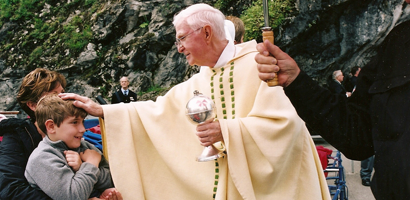 On Friday, May 25, Bishop Emeritus William G. Curlin celebrated 55 years as a priest by administering the sacrament of confirmation to 75 children at St. Thérèse Church in Mooresville.
On Friday, May 25, Bishop Emeritus William G. Curlin celebrated 55 years as a priest by administering the sacrament of confirmation to 75 children at St. Thérèse Church in Mooresville.
"I continue to help Bishop (Peter) Jugis with confirmations throughout the diocese," Bishop Curlin says. "I am encouraged and deeply moved when people invite me to special occasions and celebrations."
As a retired priest, Bishop Curlin sees his current ministry as one of providing this spiritual support to God's people.
Pictured: Bishop William Curlin is pictured blessing a child at the Shrine of Our Lady of Lourdes, France. (Photos provided by Diocese of Charlotte and Catholic News Herald archives)
Primarily, this ministry brings him to hospitals and nursing homes, which he visits on a daily basis.
"I find in my own retirement being very busy," he explains. "I no longer have all of the administrative duties and responsibilities – thanks be to God! But I feel myself free now to totally devote myself to the spiritual needs of God's people... I see this ministry to the sick and dying as a gift from God."
 Even the nurses know that he is available at a moment's notice to come to the aid of a sick or dying person.
Even the nurses know that he is available at a moment's notice to come to the aid of a sick or dying person.
"I shave before I go to bed, and I shave as soon as I get up," Bishop Curlin explains laughing. He wants to be ready any time day or night that a sick or dying person is in need of the sacraments.
Forming a habit of serving
From his first parish assignment after ordination as assistant to the senior auxiliary bishop of Washington, D.C., John MacNamara, Bishop Curlin has devoted his priestly life to spiritual and corporal works of mercy.
"I was told by my first pastor: your primary task as a priest is to help people form an intimacy with Jesus Christ in their personal life," he says. "He kept repeating Jesus' words that He would live in us. And that's the same message as Mother Teresa. My first pastor and Mother Teresa had the same words: a Christian's life is to reveal the Christ in them in the way they treat others."
It's no wonder, then, that Mother Teresa and Bishop Curlin formed a fast friendship when they first met in the early 1970s. "People could criticize me maybe for mentioning her too many times!" Bishop Curlin says, laughing.
But his work with the famed nun – whom Bishop Curlin calls "one of the greatest saints of our times" – led him to aid in founding homes for the poor and homeless with terminal diseases, notably AIDS.
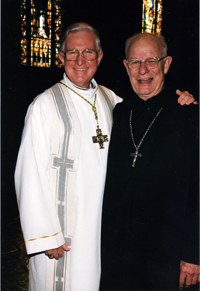 "Gift of Peace" is the home in Washington, D.C., for those dying of AIDS and other terminal conditions. It is staffed by Mother Teresa's sisters.
"Gift of Peace" is the home in Washington, D.C., for those dying of AIDS and other terminal conditions. It is staffed by Mother Teresa's sisters.
"It's very sad sometimes – the loved ones don't want them, they don't seem to care about them," Bishop Curlin recalls. "We had one little girl there. She was not a Catholic; she was 7 years old, but we said she was an angel in many ways and a joy to know. And I had the privilege of presiding at her funeral at the cemetery."
"These people are dying wanting to be loved," he says. "And nobody ever died at Gift of Peace without knowing they were loved and we were keeping them in our prayers. It's hard to die unloved and unwanted. And Mother opened the home for that reason, so people would know they weren't abandoned, that they were loved by God."
'Adsum'
"The day I was ordained, we used the word 'adsum' when we stepped forward to present ourselves for ordination," the retired bishop explains of the Latin phrase for 'I am present' that is used in the ordination Mass.
This little answer, however, became a daily part of his spiritual life.
"Every day I repeat that word. I need to say it not just once when I became a priest, but every day. You re-consecrate your life to Jesus through prayer, through devotion to the Blessed Sacrament, and a willingness to spend your life in serving others."
Even as a bishop, he never saw his vocation as a job, but as a privilege and a joy.
"If the bishop loves his priests, they will in turn be good pastors," he explains. "For example, I can think of several occasions where priests were not well, and I took them into my home and took care of them until they got back on their feet again. It was such a privilege to do that, to help them return to good health."
Inspired by others
Bishop Curlin explains that a priest's devoted life will inspire young people to consider vocations today. He himself found his priestly vocation in looking up to the priests and nuns from his life in post-World War II Washington, D.C.
"Following World War II, people were discouraged by all the horrors of the war, looking for peace and joy, and I observe now over the years that I look back to how these priests and sisters inspired me to think seriously about the priesthood.
"We were blessed with wonderful priests. They were so joyful! They were so dedicated! And we had wonderful sisters in our schools – they were an inspiration.
"There has never been a moment that I haven't thanked God for this great privilege, and I pray that God will inspire many young men to come forward (to become priests) and many young men and women to offer themselves in religious life."
To young men considering the priesthood, he urges them to speak to a priest to discern, but also to understand the demands that being a priest has on a man. The man should consider whether he has the qualities and virtues to meet those demands.
And most importantly, the young man, Bishop Curlin says, must have the heart of Christ.
"I have been privileged to ordain over 100 men to the priesthood in 24 years as a bishop. I know when I laid my hands on them, they're a priest. However, each man must bring with him the heart for it, the disposition for it, the kindness for it, the mercy and the love that the priesthood demands. Each man must bring that himself."
— Mary B. Worthington, correspondent
EDITOR'S NOTE: The Diocese of Charlotte was founded on Jan. 12, 1972. To celebrate the 40th anniversary of the diocese and the history of the Church in western North Carolina, we are publishing a year-long series spotlighting the people who built up the Church, the major developments over the past 40 years, and what changes could be in store for the future.
Bishop Emeritus William G. Curlin
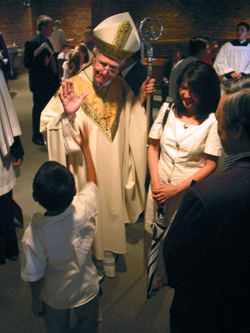
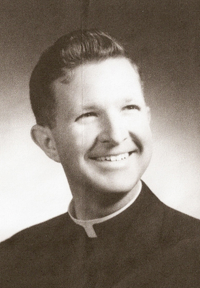
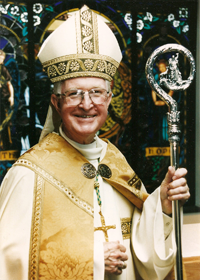 Episcopal motto: "Sentire Cum Christo" ("To Think With Christ")
Episcopal motto: "Sentire Cum Christo" ("To Think With Christ")
May 25, 1957 – Ordained by Cardinal Patrick O'Boyle, St. Matthew Cathedral, Washington, D.C.
1957 – Assistant to Bishop John McNamara, St. Gabriel Parish, Washington, D.C.
1964 – Assistant Pastor, Our Lady of Sorrows Parish, Takoma Park, Md.
1967 – Assistant Director of Vocations for Men and Assistant Pastor in St. Ann Parish, Washington, D.C.
1968 – Director of Vocations for Men and Director of Formation Program, Catholic University of America, for Washington Candidates for the Priesthood
1969 – Appointed Chaplain to Pope Paul VI
1970 – Pastor of Old St. Mary's Church, Washington, D.C.
Director of Vocations for Men
Director of Permanent Diaconate Program, Archdiocese of Washington, D.C.
1978 – Appointed Prelate of Honor by Pope John Paul II
1983 – Pastor, Nativity Parish, Washington, D.C.
1988 – Ordained as Auxiliary Bishop of Washington, D.C.
1994 – Installed as Bishop of Charlotte
2002 – Resigned as Bishop of Charlotte
More online
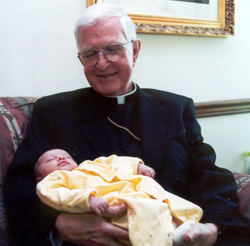 History of the Diocese of Charlotte: www.charlottediocese.org/history
History of the Diocese of Charlotte: www.charlottediocese.org/history
Anecdota in the Diocese of Charlotte's history: www.charlottediocese.org/ministries-a-departments/archives
See the full special edition from Bishop Curlin's retirement.
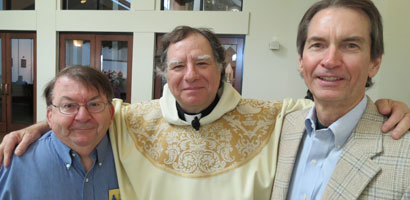
'It has really been something'
ASHEBORO — For a man who once thought he wanted to be doctor, the past 35 years serving as a priest have given Father Michael Klepacki an opportunity to bring healing of a spiritual kind to men and women around the globe.
It has been quite an adventure for this Asheboro native and former parishioner at St. Joseph Church who was ordained to the priesthood in the Diocese of Charlotte at St. Joseph Church on Holy Thursday in 1978 by then Bishop Michael F. Begley.
Father Klepacki began his priestly ministry at Our Lady of Grace Church in Greensboro, then served as pastor in Spruce Pine, Burnsville and Linville before moving to St. Joan of Arc Church in Asheville, where he spent another six years. Then his vocation took him out of the diocese: he became a chaplain with the U.S. Navy.
For 22 years he traveled the world with the Navy and the Marines – going to Japan, the Black Sea, Bulgaria, Romania, Ukraine, Spain, Turkey, Greece, the Persian Gulf and Guam – as well as serving at Camp Lejeune in Jacksonville, on the USS George Washington aircraft carrier, on the USS Bataan aircraft carrier in the Gulf Coast after Hurricane Katrina and at the Naval Base in Norfolk, Va.
"We'd get on the helicopters (from the USS Baton after Hurricane Katrina) and fly all day and all evening into New Orleans the first six weeks after the hurricane," he recalls. "That was terrible ... I'm a critical instant stress debriefer, and I would fly on the missions and at night I would debrief all the flight crews and the rescue squads."
During his military career Father Klepacki also took helicopters to go from ship to ship to celebrate Mass for the men and women in uniform. And he often slept on the ground just like the troops serving both at home and overseas.
"Sleeping on the ground on a rock at Camp Lejuene is the same as sleeping on the ground in Romania," Father Klepacki jokes as he fondly remembers his military service.
 He also headed up a new office at the Navy, serving as the commanding officer of a fleet ministry program, training and assigning 22 chaplains to ships and battle groups for the deployed and enlisted religious programs.
He also headed up a new office at the Navy, serving as the commanding officer of a fleet ministry program, training and assigning 22 chaplains to ships and battle groups for the deployed and enlisted religious programs.
His last overseas appointment took him to Guam, where he was the force chaplain for the Naval region there.
Father Klepacki is back in the Charlotte diocese now, filling in at parishes all over the western half of North Carolina and doing something he says he's always wanted to do: helping out his brother priests.
"It's so good to be back home! I've always had a desire to be a priest for priests somehow. So what I do is cover parishes when the priests need to get away, when they're sick, so every weekend I am usually somewhere different."
He says he enjoys meeting parishioners at the diverse parishes he visits.
"I get to see so many people, which is great! It's neat – it's like having multiple parishes."
Father Klepacki likes remaining active and being a help to other priests.
He also offers a bit of advice for the laity and also for men discerning a call to the priesthood:
"If you see someone who you think might have a vocation, bring it up with them," he says. That's what happened to him, when he switched from eyeing a medical career to a priestly vocation after a Baptist preacher once encouraged him to pursue the priesthood if he was feeling called to it.
He adds, "And if you are a man who feels you may have a vocation, seek out a priest you feel comfortable with. See what they do. Take a trip to a seminary. Find someone you can talk to. Don't keep it inside."
— SueAnn Howell, senior reporter

